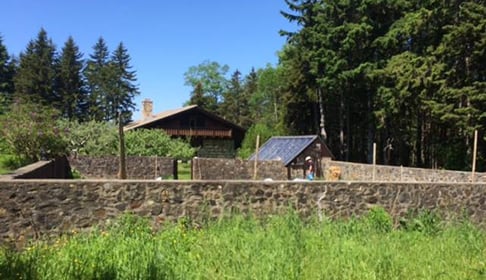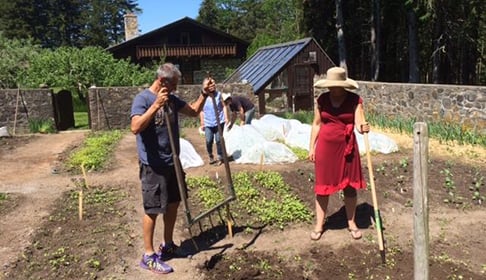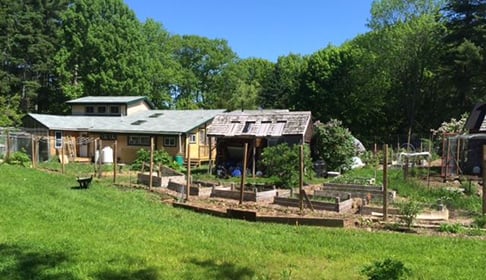By Gene Baur, President and Co-Founder
I recently visited Maine to speak at the VegFest, an annual event organized by the Maine Animal Coalition. Being surrounded by others who are interested in a more compassionate world was positive and inspiring, and it’s so good to see the community growing. Like other VegFest events I’ve attended, this event illustrated a burgeoning awareness about the benefits of plant-based foods and the need to reform our current food system.
I also visited The Good Life Center, which was founded “to perpetuate the philosophies and lifeways of Helen and Scott Nearing.” The Nearings were vegetarians and pioneers of the modern “back to the land” movement. In 1932, they left urban living for rural Vermont before eventually settling in coastal Maine in the early 1950s. Helen and Scott wanted to be self-sufficient and healthy, and, in Helen’s words, to “liberate and dissociate ourselves, as much as possible, from the cruder forms of exploitation: the plunder of the planet; the slavery of man and beast; the slaughter of men in war, and of animals for food.” Scott lived to be 100, and Helen died in a car crash at 91.

The “back to the land” movement, which focuses on environmentally sustainable foods, is thriving in Maine, with various small farms occupying the landscape. In both urban and rural locations, concerned citizens are seeking to be more connected to nature as well as to be more resilient and self-reliant. Part of this movement often includes growing one’s own food. Sweet Dog Farm in Brooksville, Maine, close to the Nearings’ farm on the Blue Hill Peninsula, is an example of the kind of farm that grows food in a healthy, sustainable way. They produce organic fruits, vegetables, and herbs without using animal manure, blood, bone meal, or any slaughter industry byproducts. Instead, they use plants, including seaweed that is plentiful in the nearby ocean, to enrich and build up the soil. They market their products directly to customers who can visit and purchase goods right on the farm. This type of community-oriented, organic, vegan farm is the wave of the future.

Sweet Dog Farm is run by Bob Jones and Doris Groves, who host participants from World Wide Opportunities on Organic Farms (WWOOF) (http://wwoof.net/) to lend a hand. WWOOFers volunteer their time in exchange for the chance to live on a farm and learn about rural life. During my visit, I met three WWOOFers who work at Sweet Dog Farm, one from Michigan, one from New York, and one from Alabama. They made a delicious lunch that we all enjoyed together, along with a group of neighbors who joined the meal and conversation. I am inspired to see so many people living mindfully and working to create a better world through healthy food systems and communities.
The WWOOFers at Sweet Dog Farm remind me very much of the interns at Farm Sanctuary — people who are involved in making a positive difference in our world. (For information on Farm Sanctuary internships, click here.) Since 1986, our interns have helped to advance Farm Sanctuary’s mission. Interns play an integral role at our shelters, and they continue to advance our cause when they return home and share what they learned with friends and family. I’m sure WWOOFers do the same.

The food movement is evolving, and it’s encouraging to see more and more people take an interest in growing their own food and embracing ideas that the Nearings’ promoted decades ago when they said: “We believe that all life is to be respected — non-human as well as human. Therefore, for sport we neither hunt nor fish, nor do we feed on animals
